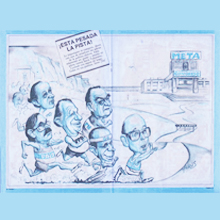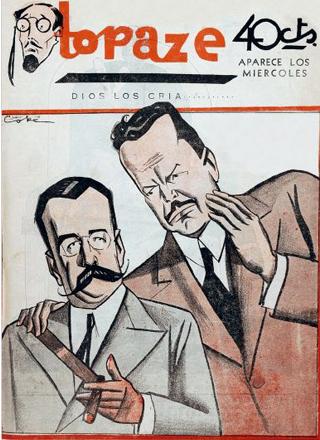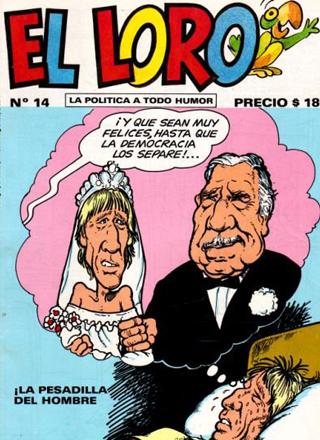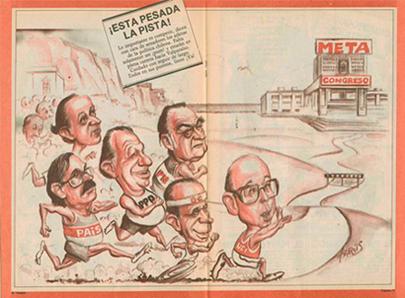
POLÍTICA Y HUMOR
“Supongamos existente la aspiración a insultar a una determinada persona; mas al paso de esta aspiración salen el sentimiento del propio decoro y la cultura estética, con tal fuerza, que el insulto tiene que ser retenido, y si pudiera surgir mediante una transformación de la situación o del estado de ánimo, esta victoria de la tendencia insultante sería sentida después con displacer. Queda, pues, suprimido el insulto. Mas se ofrece la posibilidad de extraer un buen chiste del material de palabras y pensamientos que habían de servir para expresarlo, o sea una ocasión de extraer placer de otras fuentes distintas, cuyo acceso no está prohibido por la misma represión. Sin embargo, esta segunda conquista de placer no podría realizarse si el insulto hubiera de ser abandonado; más en cuanto éste es admitido, en su nueva forma expresiva, queda ligada también a él la nueva consecución de placer”. (1)
Sigmund Freud
Con alguna frecuencia la política se sirve del humor para, también, llevar adelante su cometido, otras veces son los humoristas los que contribuyen al debate aportando sus respectivos puntos de vista.
Por caso, las caricaturas son y han sido instrumentos destacados para ejercer la crítica política mediante el humor.
El ensayista, poeta y crítico de arte francés Charles Pierre Baudelaire (1821-1867) en su fundamental obra “Lo cómico y la caricatura” (2) apuntó: “Para que exista comicidad, es decir, emanación, explosión, liberación de lo cómico, tiene que haber dos seres presentes; -que es especialmente en el que ríe, en el espectador, en el que reside lo cómico; -que sin embargo, en lo que respecta a esta otra ley de ignorancia, debe hacerse una excepción con los hombres que tienen la profesión de desarrollar en ellos el sentimiento de lo cómico y de sacarlo de sí mismos para diversión de sus semejantes, fenómeno que entra en la clase de todos los fenómenos artísticos que denotan en el ser humano la existencia de una dualidad permanente, la facultad de ser a la vez uno y otro”. (3)
La constante histórica, por la cual la perspectiva generada desde el humor político debe ser conocida y estudiada para comprenderla cabalmente y aventar, por ejemplo, simplismos interpretativos o atribuirles inmensos poderes que nunca han tenido ni en regímenes autoritarios o democráticos.
El humor político lejos está de ser patrimonio de una ideología, de un grupo partidario en particular, de una época, etcétera; los ejemplos son muchos que reafirman esta cuestión.
La oposición y el oficialismo, asiduamente, también trasladan al humor político sus debates, confrontaciones, denuncias, etcétera.
El tercero en cuestión, es decir, el lector, el espectador, etcétera, es el que elije reírse o no; el menoscabarlo ya que encuentra placentero apreciar lo expresado humorísticamente pues las opiniones o asuntos esgrimidos son poco convenientes a una postura determinada es una cuestión relativamente frecuente y se debe estar atento para justipreciarla cabalmente.
En las confrontaciones partidarias a veces los sesgos son palpables, la verdad y la falsedad se trapichea con alguna asiduidad.
Los intercambios de opiniones políticas son en sí muy valiosos y contribuyen en mucho al desarrollo de las ideas.
El humor aporta pero nunca es decisivo, ni mucho menos.
Chile es un buen ejemplo de lo antedicho y vale la pena conocerlo disfrutándolo.
NOTAS Y REFERENCIAS
1) Freud, Sigmund. El chiste y su relación con lo inconsciente. Biblioteca Nueva. Tercera edición. Tomo I. Página 1105. Madrid, España. 1973.
2) Reúne tres interesantes ensayos publicados a partir de la quinta década del Siglo XIX.
3) Baudelaire, Charles. Lo cómico y la caricatura. Visor. Páginas 50 y 51. Madrid, España. 1988.



POLITICS AND HUMOR
By Alejandro Rojo Vivot
“Suppose the aspiration to insult a certain person exists; but in the wake of this aspiration the feeling of one's own decorum and aesthetic culture comes out with such force that the insult has to be withheld, and if it could arise through a transformation of the situation or the state of mind, this victory of the tendency insulting would later be felt with displeasure. The insult is therefore deleted. But it offers the possibility of extracting a good joke from the material of words and thoughts that were to be used to express it, that is, an opportunity to extract pleasure from other different sources, whose access is not prohibited by the same repression. However, this second conquest of pleasure could not be realized if the insult were to be abandoned; But as soon as this is admitted, in its new expressive form, the new achievement of pleasure is also linked to it.” (1)
Sigmund Freud
Sometimes politics uses humor to also carry out its mission, other times it is the comedians who contribute to the debate by contributing their respective points of view.
For example, cartoons are and have been outstanding instruments for exercising political criticism through humor.
The French essayist, poet and art critic Charles Pierre Baudelaire (1821-1867) in his fundamental work “The Comic and the Caricature” (2) noted: “For comicity to exist, that is, emanation, explosion, liberation of the comic , there must be two beings present; -that it is especially in the one who laughs, in the spectator, in which the comic resides; -that however, with regard to this other law of ignorance, an exception must be made for men who have the profession of developing in themselves the feeling of the comic and of bringing it out of themselves for the amusement of their fellow men, a phenomenon that “It enters the class of all artistic phenomena that denote in the human being the existence of a permanent duality, the faculty of being both one and the other at the same time.” (3)
The historical constant, by which the perspective generated from political humor must be known and studied to fully understand it and eliminate, for example, interpretative simplisms or attributing to them immense powers that they have never had, not even in authoritarian or democratic regimes.
Political humor is far from being the heritage of an ideology, of a particular party group, of a time, etc.; There are many examples that reaffirm this issue.
The opposition and the ruling party also regularly transfer their debates, confrontations, complaints, etc. to political humor.
The third party in question, that is, the reader, the spectator, etc., is the one who chooses to laugh or not; undermining it since it is pleasant to appreciate what is expressed humorously because the opinions or issues put forward are not suitable for a given position is a relatively frequent issue and one must be attentive to fully appreciate it.
In partisan confrontations sometimes the biases are palpable, truth and falsehood are traded with some assiduity.
Exchanges of political opinions are in themselves very valuable and contribute greatly to the development of ideas.
Humor contributes but is never decisive, far from it.
Chile is a good example of the above and it is worth getting to know it and enjoying it.
NOTES AND REFERENCES
1) Freud, Sigmund. The joke and its relationship with the unconscious. New Library. Third edition. Volume I. Page 1105. Madrid, Spain. 1973.
2) It brings together three interesting essays published from the fifth decade of the 19th century.
3) Baudelaire, Charles. The comic and the caricature. Viewfinder. Pages 50 and 51. Madrid, Spain. 1988.
(This text has been translated into English by Google Translate)
